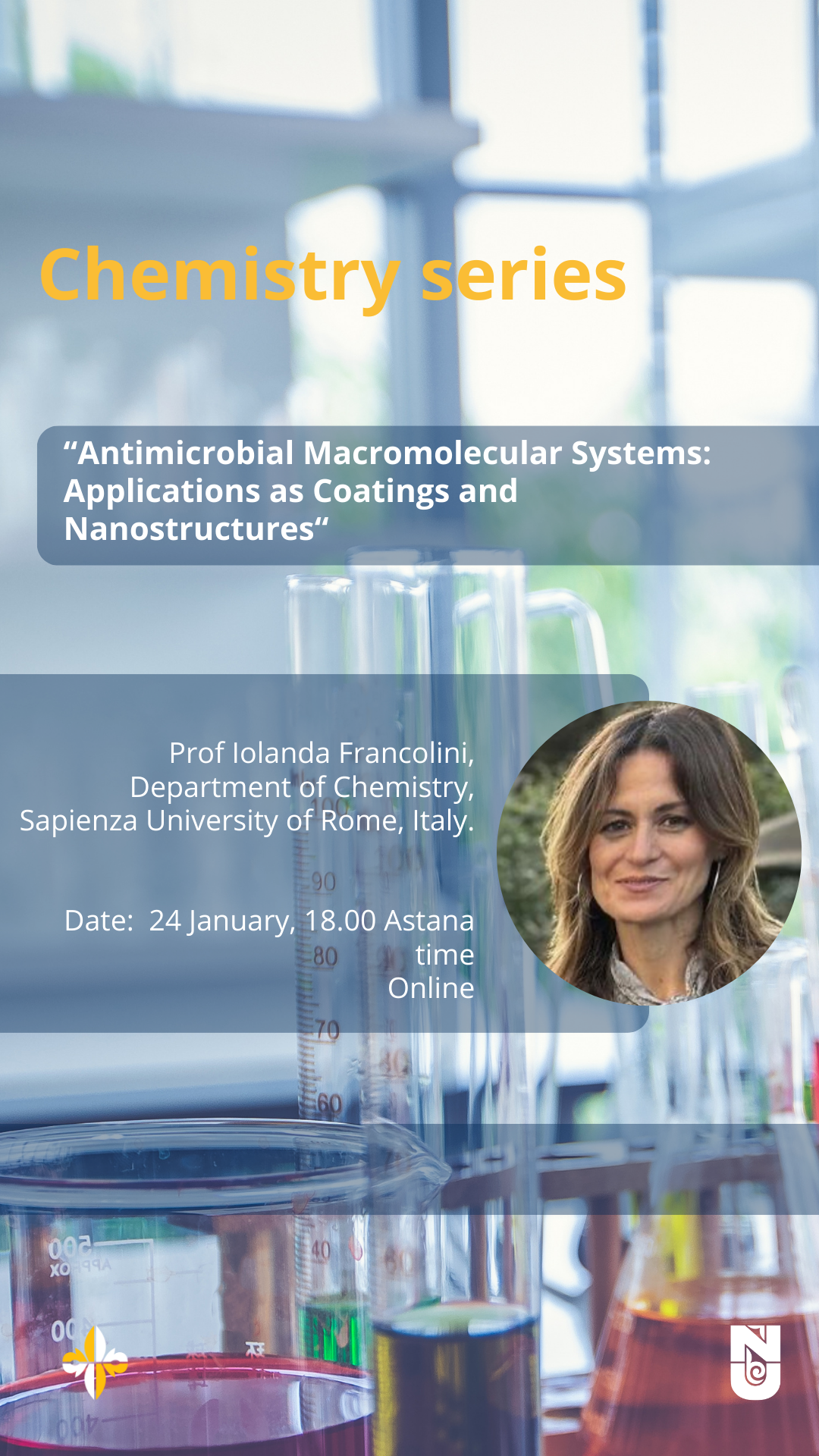The Chemistry Seminar at NU will start with the invited research lecture on
"Antimicrobial Macromolecular Systems: Applications as Coatings and Nanostructures"
by our guest speaker Professor Iolanda Francolini
Department of Chemistry, Sapienza University of Rome, Rome, Italy.
Date: 24 January 2025, 18.00 Astana time
To view recording please here
Biography: Iolanda Francolini is an Associate Professor in Industrial Chemistry at Sapienza University of Rome, with expertise in macromolecular chemistry, focusing on the science and technology of polymers, advanced biomaterials, antimicrobial polymers, bioplastics, and sustainable recycling solutions.
Abstract: The development and biomedical application of high-performance polymeric materials have driven significant therapeutic advancements in recent years. Both natural and synthetic polymers are now considered materials of choice for a wide range of medical and pharmaceutical products, including implantable devices, porous scaffolds for tissue regeneration, and nano- or micro-particles for drug delivery. This widespread adoption is primarily due to the chemical and physical versality of polymers, enabling "ad hoc" designs tailored to specific applications. Furthermore, these materials are easily processed and can be functionalized with bioactive molecules.Among bioactive polymers, macromolecules with antimicrobial activity have emerged as a particularly promising class, offering innovative solutions to pressing public health challenges such as antibiotic resistance. Unlike low molecular weight biocides, an>microbial polymers provide enhanced efficiency, selectivity, and stability, while reducing the risk of promoting resistance. In this seminar, I will present key advances in antimicrobial polymer systems developed during my research, highlighting strategies to optimize their structural and compositional properties for enhanced activity and reduced toxicity. Particular focus will be given to their applications as coatings for implantable medical devices, hydrogels for wound care, and carriers for antimicrobial formulations designed to combat resistant infections.
"Antimicrobial Macromolecular Systems: Applications as Coatings and Nanostructures"
by our guest speaker Professor Iolanda Francolini
Department of Chemistry, Sapienza University of Rome, Rome, Italy.
Date: 24 January 2025, 18.00 Astana time
To view recording please here
Biography: Iolanda Francolini is an Associate Professor in Industrial Chemistry at Sapienza University of Rome, with expertise in macromolecular chemistry, focusing on the science and technology of polymers, advanced biomaterials, antimicrobial polymers, bioplastics, and sustainable recycling solutions.
Abstract: The development and biomedical application of high-performance polymeric materials have driven significant therapeutic advancements in recent years. Both natural and synthetic polymers are now considered materials of choice for a wide range of medical and pharmaceutical products, including implantable devices, porous scaffolds for tissue regeneration, and nano- or micro-particles for drug delivery. This widespread adoption is primarily due to the chemical and physical versality of polymers, enabling "ad hoc" designs tailored to specific applications. Furthermore, these materials are easily processed and can be functionalized with bioactive molecules.Among bioactive polymers, macromolecules with antimicrobial activity have emerged as a particularly promising class, offering innovative solutions to pressing public health challenges such as antibiotic resistance. Unlike low molecular weight biocides, an>microbial polymers provide enhanced efficiency, selectivity, and stability, while reducing the risk of promoting resistance. In this seminar, I will present key advances in antimicrobial polymer systems developed during my research, highlighting strategies to optimize their structural and compositional properties for enhanced activity and reduced toxicity. Particular focus will be given to their applications as coatings for implantable medical devices, hydrogels for wound care, and carriers for antimicrobial formulations designed to combat resistant infections.
